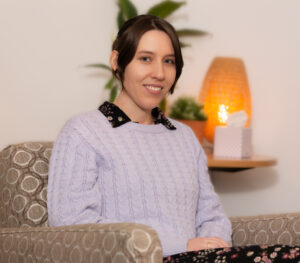
Clare McInnerney | Psychologist
Clare McInnerney | Educational & Developmental Psychologist
BPsychSc (Hons), MPsych
I enjoy assisting young people in managing life’s challenges, including those related to education, work, maintenance of healthy relationships, and taking care of mental health. I have experience helping people with a range of challenges from all walks of life and have worked in community services, educational, and general mental health settings. I strive to work collaboratively with my clients to understand their concerns, develop strategies to improve wellbeing, and achieve their therapy goals.
I work with children (4+) adolescents and young adults to manage existing and new issues as they arise. My treatment modalities include Cognitive Behavioural Therapy (CBT), Acceptance and Commitment Therapy (ACT), Play Therapy, Mindfulness, and parenting support based on evidenced based programs such as Triple P.
My areas of interest include:
- Children and adolescents
- Anxiety
- Depression and low mood
- Academic and cognitive difficulties (assessments available)
- Self-esteem and body image concerns
- Parenting difficulties (including challenging behaviour and emotional regulation difficulties)
- Relationship difficulties
- School issues including transitions, school refusal and bullying
- Sleep difficulties
- Trauma – EMDR (Eye Movement Desensitization and Reprocessing)
I am an LGBTQIA+ affirming practitioner who offers a safe and welcoming space for all.
Over and above my standard psychology qualifications, I have advanced training in paediatric and adolescent psychology, and am a registered Educational and Developmental Psychologist.
An interview with Clare McInnerney
Why did you become a psychologist?
I became a psychologist because I was initially interested in supporting individuals with their mental health and wellbeing goals. However, as I continued through my studies, I became more interested in working collaboratively with families, schools and other professionals to support young people’s education and developmental needs.
What are you passionate about in Psychology?
As a psychologist, I’m passionate about supporting young people who are experiencing anxiety, depression, low moods. Other areas of interests include exploring neurodiversity, and the support that people who are neurodivergent might need in their everyday lives. I’m also interested in supporting LGBTQIA+ young people.
What gives you a sense of satisfaction?
I get a sense of satisfaction at work when my clients come in and say that they’ve spent time in between sessions, exploring the ideas that we’ve spoken about here together. So I’d love to get that feedback about whether things worked for them. Or if they didn’t, that’s just more material for us to work through.
What can a client expect in their first session?
In the first session, it’s about creating a space where the client can feel comfortable and for us to get to know each other. So I will ask clients, what they’re presenting with, what they would like help with this time about any previous support that they’ve had, things they found useful and what they’d like to continue. For younger children there’s rapport building, so playing games and art and things like that, what they might feel more comfortable starting off with. And then it’s important to leave the first session with a plan for what the next steps will be.
